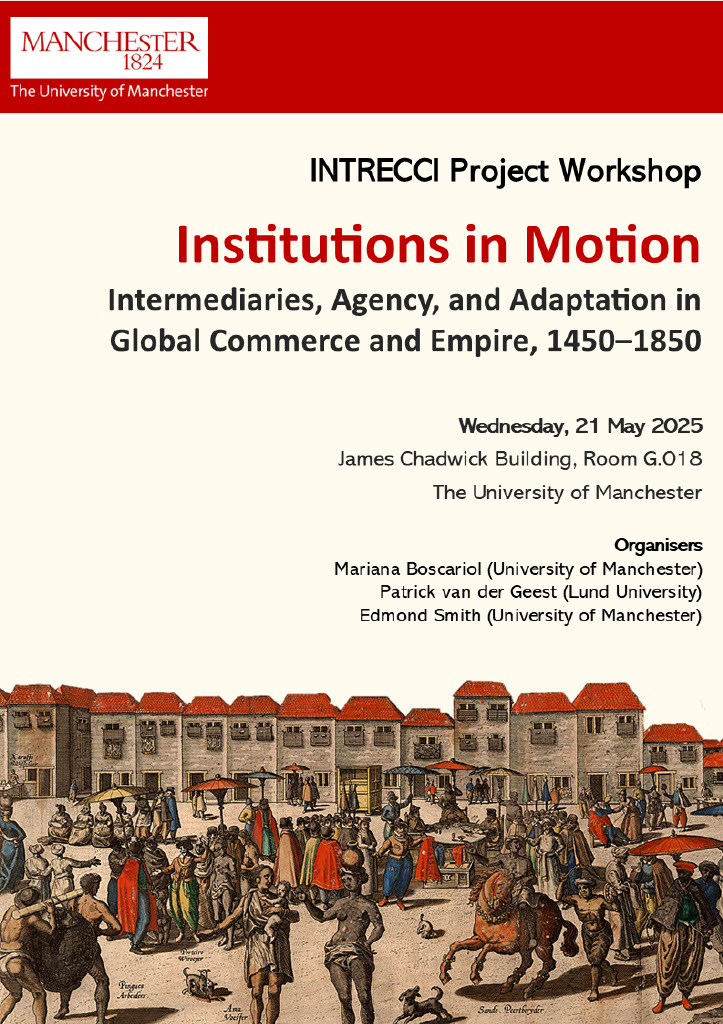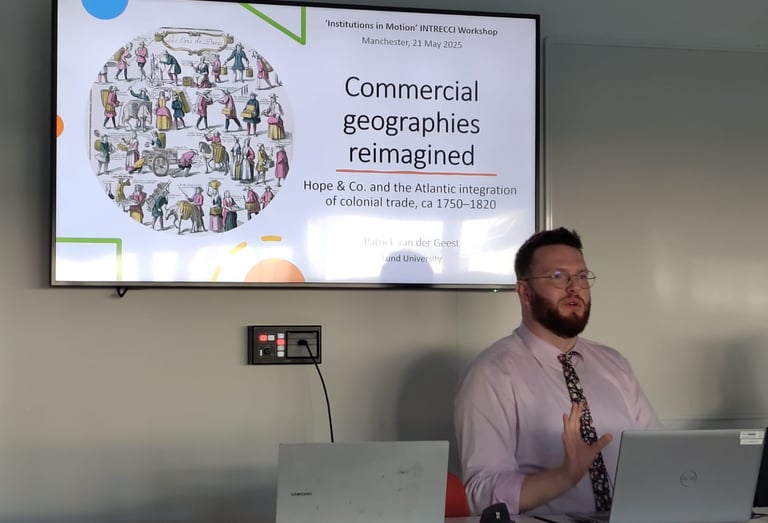Institutions in Motion
Intermediaries, Agency, and Adaption in Global Commerce and Empire, 1450-1850
Patrick van der Geest
5/26/20254 min read
Earlier this month, early-career historians from across the UK and beyond gathered at the University of Manchester for Institutions in Motion, the inaugural workshop of the INTRECCI project. The event offered a vibrant platform to explore the vital roles of intermediaries, agents, and adaptive practices that shaped global commerce and empire between 1450 and 1850. Through engaging discussions and detailed case studies, participants examined how networks of people - not just corporations or states - were instrumental in connecting worlds, transforming systems, and driving change.


On 22 May 2025, The University of Manchester buzzed with lively conversation as early career historians from across the UK and beyond gathered for the inaugural workshop of the ERC-funded INTRECCI project. Titled Institutions in Motion: Intermediaries, agency, and adaptation in global commerce and empire, 1450–1850, the event explored the often-overlooked yet crucial role of intermediaries and agents in shaping global trade and empire during the early modern period and the dawn of the modern era.
INTRECCI - short for Institutional Transformation and the Entangled Commercial Cultures of International Commerce, 1450–1750 - is a European Research Council-funded project investigating the dynamics of institutional change and the essential roles intermediaries played in global trade networks. This inaugural workshop, organised by Mariana Boscariol (Research Associate), Patrick van der Geest (visiting doctoral student from Lund University), and Edmond Smith (Principal Investigator), gathered emerging scholars to delve into these themes. The day offered an energising mix of discussion, intellectual exchange, and collaborative reflection, setting the stage for future dialogues and partnerships under the INTRECCI umbrella.
The event focused on a simple, but vitally important question: what happens when we shift our gaze from state-centred histories to the networks, agents, and practices that underpinned global trade? Rather than viewing institutions as monolithic structures imposed from above, the workshop foregrounded the adaptability, ingenuity, and localised practices of those navigating the complex realities of commerce and governance from the ground up.
The participants - a diverse group of early career researchers, many still PhD students - brought fresh perspectives from a range of regional, thematic, and chronological contexts. While most were affiliated with British universities, their research spanned Europe, Asia, Africa, and the Atlantic world, offering a vibrant cross-section of early modern and modern global history.
The day unfolded across three thematic panels, each chaired by one of the INTRECCI project’s Research Associates: Shounak Ghosh, Mariana Boscariol, and Safya Morshed. The first panel, Adapting institutions, negotiating authority, featured Andrés Jácome’s (Cambridge) exploration of how Portuguese New Christians in Cartagena de Indias adapted their cultural and economic practices within the Afro-Caribbean context; Nitya Gundu’s (Warwick) examination of the social authority of Chief Merchants in seventeenth-century Coromandel; and Andrew Steels’ (Warwick) insightful analysis of how Levant Company regulations on marriage adapted - or failed to adapt - to local realities in the Ottoman Empire.
The second panel, Intermediaries, mobilities, and the edges of empire, brought together Georgina Watson’s (Manchester) fresh perspective on Mediterranean diplomacy, focusing on the relationship between Emir Fakhr ad-Din II and Cosimo II de Medici; Le Tian’s (Bristol) study of Canton’s Hong merchants and the trust systems that underpinned the Sino-British tea trade; and Lloyd Belton’s (Glasgow) investigation of the Kru labour crisis in West Africa, where local resistance confronted imperial efforts to regulate mobility and labour.
The third panel, Speculative states and corporate infrastructures, turned to cross-cultural brokerage and the structures of finance and trade. Freek Loves (European University Institute) provided a compelling examination of Batavia’s urban Chinese elite in facilitating maritime trade; Karolina Hutkova (Oxford) presented a thought-provoking argument that the English East India Company operated as a company-state at home in Britain’s fiscal system; and Patrick van der Geest (Lund - seen below) analysed Hope & Co.’s speculative strategies for integrating Atlantic commodity markets, highlighting the firm’s role in mediating between commerce and imperial governance.


As the panels drew to a close, participants gathered for Alejandra Irigoin’s (LSE) keynote lecture, Piety, profits and persuasion: Financing Europeans’ private trade in Asia. With characteristic energy and insight, Irigoin traced the complex entanglements of religious institutions, private finance, and imperial expansion in Iberian maritime trade. Her talk offered a fitting capstone to a day that challenged familiar narratives and encouraged participants to think creatively about the interplay of commerce, actors, and globalisation.
The workshop was not all theory and presentations. Conversations continued informally over lunch and coffee, and many participants reconvened for a convivial dinner at the Armenian Taverna in Manchester’s city centre. The day’s discussions revealed not only the depth and breadth of current research into intermediaries and institutions but also the power of collaborative engagement in shaping the future of the field.
At its core, Institutions in Motion reminded us that global commerce and empire were not solely the products of state policy or institutional blueprints. Rather, they were crafted, sustained, and transformed by the individuals and networks who operated between empires, across borders, and beyond established frameworks. By foregrounding these often-overlooked actors, the workshop opened new avenues for understanding the lived realities of global history and the possibilities for rethinking its narratives.
As participants departed Manchester, one thing was clear: Institutions in Motion was more than a workshop. It was an invitation to imagine global history differently - and to do so together.
